Archive for September 10th, 2013

Lightning strike disrupts LIME’s Brac service
(CNS): Some LIME customers on Cayman Brac are still without full internet and land-line service as a result of a lightning strike to the Stake Bay Exchange early Tuesday morning. According to a LIME spokesperson, by mid morning 50% of customers affected, who were in the Stake Bay area, had their service restored. She said the Brac team had to wait on necessary parts to be delivered from Grand Cayman this afternoon, and were still working on full restoration Tuesday evening.
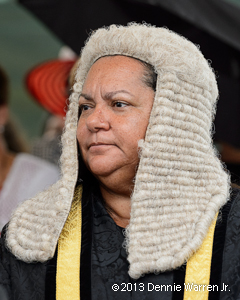
Speaker recognized for service to CPA
 (CNS): Juliana O'Connor-Connolly, the speaker of the Legislative Assembly, received a plaque in recognition of her service to the Commonwealth Parliamentary Association (CPA) in South Africa last week at its 59th conference in Johannesburg as she ended her term as an Executive Committee member for the Caribbean. However, the delegation to Johannesburg, which included Education Minister Tara Rivers and Opposition Leader McKeeva Bush caused controversy in Cayman in the midst of a clamp down on government travel. Although O’Connor-Connolly’s trip was covered by the CPA, the airfares for both Bush and Rivers came out of the local branch of the CPA’s budget, which is funded by the tax-payer.
(CNS): Juliana O'Connor-Connolly, the speaker of the Legislative Assembly, received a plaque in recognition of her service to the Commonwealth Parliamentary Association (CPA) in South Africa last week at its 59th conference in Johannesburg as she ended her term as an Executive Committee member for the Caribbean. However, the delegation to Johannesburg, which included Education Minister Tara Rivers and Opposition Leader McKeeva Bush caused controversy in Cayman in the midst of a clamp down on government travel. Although O’Connor-Connolly’s trip was covered by the CPA, the airfares for both Bush and Rivers came out of the local branch of the CPA’s budget, which is funded by the tax-payer.
Having been distracted from her ministerial post for several weeks as a result of the courtroom battle following an unsuccessful petition challenging her election to office, Rivers came in for particular criticism from the public for attending the conference at a pressing time for her ministry, with high unemployment and the start of the school year.
Nevertheless, O’Connor-Connolly, who returned to the island earlier and in time for the governor's swearing in, defended Rivers' attendance at the conference. The theme was "Effective Solutions to Commonwealth Developmental Challenges" and included sub-conferences for delegates from countries and territories with a population of less than 500,000 and a conference for Commonwealth Women Parliamentarians. It also included a meeting of the CWP group to elect a new Chairperson to serve for the 2013-2016 period.
One of the mandates adopted by the CPA and its various branches, including the Cayman Islands, is increasing women's participation and representation in the political process, withan aim of achieving 30% representation by women in the parliaments of each Commonwealth member country by 2015.
"The involvement of women parliamentarians is vital to the aims and goals of the CPA, and member branches are encouraged to send as many women parliamentarians to the conferences as possible,” said O'Connor-Connolly. “Minister Rivers, being the only women in Cabinet, was initially asked to attend the regional conference held earlier this year in July, but was unable to do so at that time. She was, however, able to participate at the annual conference in Johannesburg and I am delighted that she was able to attend. She made many poignant contributions and a very favourable impression on many of the other delegates in attendance," the speaker added as she offered her support to the minister’s participation.
Rivers, who released a lengthy statement Tuesday morning said it was "a very enlightening and beneficial experience", which was relevant to her ministerial duties.
The Cayman Islands Branch of the CPA typically sends two delegates — one member of the opposition and one member of government — to each of the CPA conferences in which the Cayman Islands are invited to attend.
Related article on CNS:
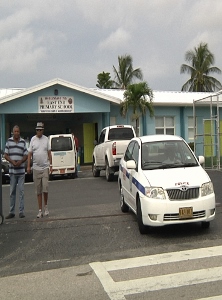
Teacher trouble in East End
 (CNS): Recruitment problems in the local education services led to demonstrations and a padlocked school gate in East End Tuesday. Disgruntled parents reportedly applied the lock to the school gates in protest this morning over a teacher shortage at the district primary as the school year gets underway. A statement released by the education ministry revealed that there are still a number of teacher vacancies across schools being covered by supply teachers or existing staff on a temporary basis while recruitment continues. The East End shortage was blamed on an ex-pat teacher who, according to officials, had arrived to take up the post prior to the start of school but who had since left the island.
(CNS): Recruitment problems in the local education services led to demonstrations and a padlocked school gate in East End Tuesday. Disgruntled parents reportedly applied the lock to the school gates in protest this morning over a teacher shortage at the district primary as the school year gets underway. A statement released by the education ministry revealed that there are still a number of teacher vacancies across schools being covered by supply teachers or existing staff on a temporary basis while recruitment continues. The East End shortage was blamed on an ex-pat teacher who, according to officials, had arrived to take up the post prior to the start of school but who had since left the island.
During the day on Tuesday CNS received a number of unconfirmed reports and information that parents with children at both Savannah and John A Cumber primary in West Bay also had expressed concerns about shortages and other school problems. There was no official confirmation, however, that there were any other issues relating to other schools across the islands.
The ministry said that it believed the school in East End had been padlocked by an “unknown individual” because of the missing teacher and said that the entry to a classroom had also been damaged.
With two members of East End Primary School promoted this year, the ministry explained that it had recruited a “well-qualified Year 5 teacher”, who arrived in Cayman before school began but the teacher did not stay. “Due to circumstances beyond the control of the Department of Education Services the person appointed chose not to follow through with her professional commitment and has since left the island.”
Officials said that the recruitment process was underway to find another qualified Year 5 teacher and expected one to be assigned to East End Primary School in due course. In the interim, a supply teacher was provided but the principal chose to provide cover for the class from the existing staff.
This is one of several teacher vacancies, which officials admitted was not desirable at the start of the school year, but given that teachers are only required by law to give one month notice and overseas recruitment can take up to three months, the ministry said it was "an unfortunate reality”.
Education Minister Tara Rivers, who returned to work yesterday following her two weeks away, said locking the school gate was not the way to communicate with officials.
“It is important for us that the community is aware of the factthat we are engaged in a process of continuous evaluation and as challenges are brought to our attention we respond accordingly,” Rivers said. Expressing concern regarding the choice of action taken by the parents, she said government was committed to ensuring quality education for students and applaud parental involvement in this process.
“However, we seriously discourage members of the public from locking up schools in an effort to communicate with the education system. I, as minister, as well as the chief officer and chief educational officer and their staff are available to discuss issues of parental concern with schools, PTAs, and parents on an individual basis if necessary. Therefore, I encourage parents to use their school's PTA as a vehicle to have their concerns addressed,” she added.
The Department of Education Services said it was working with the East End Primary School principal to ensure that adequate cover was in place while a skilled teacher was recruited.
See full release below.

Morale falls in CS over cuts
 (CNS): Deputy Governor Franz Manderson said that he and the civil service management are currently exploring ways to boost morale among government workers after more than a year of cuts and other austerity measures. Despite the resilience of the service, morale “has been weakened”, Manderson said, and it was important that the critical services provided by the public sector were not compromised. Speaking in the Legislative Assembly Friday as he handed the baton over to the new governor, Helen Kilpatrick, Manderson said a great deal of effort and sacrifice over the past financial year in the CS had reduced its size and achieved almost $12 million in savings.
(CNS): Deputy Governor Franz Manderson said that he and the civil service management are currently exploring ways to boost morale among government workers after more than a year of cuts and other austerity measures. Despite the resilience of the service, morale “has been weakened”, Manderson said, and it was important that the critical services provided by the public sector were not compromised. Speaking in the Legislative Assembly Friday as he handed the baton over to the new governor, Helen Kilpatrick, Manderson said a great deal of effort and sacrifice over the past financial year in the CS had reduced its size and achieved almost $12 million in savings.
“What is of even more significance is that these savings and reductions in numbers were achieved while offering additional services to the public,” Manderson said. “With the support of the elected government, chief officers and I continue to explore ways to reduce the size and cost of the service, and together we have introduced a number of polices, such as the travel policy, which has already yielded dividends in terms of reducing the costs of official travel. I am grateful for the support of the premier in enforcing this policy,” Manderson added.
In his welcome address the deputy governor noted that Kilpatrick had “unique knowledge and experience” that was going to be of “great benefit” to him and his public sector team and her willingness to share her knowledge and expertise was welcomed.
“Chief officers and I look forward to working closely with you as we continue to build on the progress made to improve the overall performance of the civil service,” he added. “I am very proud of my senior team and the overall talent that exists in the service, which I am sure that you will recognize as you visit the various ministries, portfolios and departments and meet staff.”
Although significant progress was being made in relation to accountability across the civil service, he admitted that more must be done and said he was looking forward to discussing this matter with Kilpatrick and seeking her advice.
Along with law and order, one of the governor’s areas of responsibility is the issue of good governance and the civil service. As such, Kilpatrick will be heavily involved in theongoing changes which will see the public sector shaved down even further in the coming years in order to meet the timetable agreed between the CIG and the UK to get the country’s finances back on track.
However, with government planning a major overhaul of immigration and the obvious pressing need for more staff at the National Development and Workforce Agency to address the growing local unemployment problem, even more cuts will have to be made in other departments to cover those head count increases.

After school programme needs more funding
 (CNS): With 1400 children already taking part and more kids joining each school year, the Extended After-School Programme (EASP) is in need of cash and Michael Myles, the programme coordinator for at-risk-youth for the education ministry said it is grateful for the community support. Last week, the Scotiabank and Trust (Cayman) Ltd. presented a cheque for CI$5,000 to Myles, as the banks is one of the major supporters of this programme and has been a sponsor for the past two years. “We are very grateful for the continued support of Scotiabank and all our generous sponsors,” said Michael Myles.
(CNS): With 1400 children already taking part and more kids joining each school year, the Extended After-School Programme (EASP) is in need of cash and Michael Myles, the programme coordinator for at-risk-youth for the education ministry said it is grateful for the community support. Last week, the Scotiabank and Trust (Cayman) Ltd. presented a cheque for CI$5,000 to Myles, as the banks is one of the major supporters of this programme and has been a sponsor for the past two years. “We are very grateful for the continued support of Scotiabank and all our generous sponsors,” said Michael Myles.
“As the student demand and interest in the programme increases year after year, we continue to need and always welcome more community support,” he added.
The programme is available at both primary and high schools; Clifton Hunter High School, John Gray High School, Cayman Brac High School, Sir John A. Cumber Primary School, George Town Primary School, Red Bay Primary School, Bodden Town Primary School, North Side Primary School and Cayman Brac Primary School.
The ministry said the programme, which began in 2011 under the previous administration, provides wholesome and challenging activities after school in a structured environment, led by caring and knowledgeable paid and voluntary instructors. It operates Monday through Friday with its day-to-day operations managed by the Cayman Outreach Association.
The programme continues to improve with new initiatives and standards for the 2013-14 year. Several of the improvements include handbooks for students and parents, an orientation programme, safety training for instructors and volunteers in CPR and first aid, an identification programme for both instructors and students, and a uniform shirt for all instructors.
For more information on the programme or to make donations, please contact Michael Myles at 916-4992 or via email at info@easp.ky

Stigma is barrier to suicide prevention, say officials
(CNS): Cayman joins many countries in supporting World Suicide Prevention Day (WSPD) today, as officials focus on removing the stigma which begins with the support of families, healthcare providers, employers, and, by-and-large, the community. The Health Services Authority’s (HSA’s) Psychiatrist, Dr Arline McGill, said suicidal behaviours are often looked down upon. The Public Health Department is organising activities this week to address that and the international theme of "Stigma: A Major Barrier to Suicide Prevention". Events will focus on strengthening persons’ mental, physical and spiritual wellness, while at the same time reducing the stigma associated with this mental health condition.
Encouraging public participation, the minister responsible for health, Osbourne Bodden said, “On World Suicide Prevention Day I hope that communities across the Cayman Islands will encourage co-workers, family and friends to help promote hope and resiliency and reduce the number of persons suffering from suicidal behaviour.”
Held at St Matthew University, the various events will kick off on Wednesday, 11 September at 6:30 p.m. with The Challenge of Being Happy – academic discussions in surviving suicide and overcoming chronic sadness. Refreshments will also be available.
On the following day, Thursday 12 September at 5:30 p.m. at Mary Miller Hall, a community empowerment public forum: Moving On will explore life after attempted-suicide, including those it affects (self and families) and how they survive. Related discussions will also target the stigma surrounding suicide andencourage these persons to reach forward to happiness.
Later, on Friday, 13 September at 6:30 p.m. at the Family Worship Centre, the Art & Science of Happiness event will help tertiary level students, as well as teens leaving high school, to better appreciate themselves and the experiences that help to make them unique; to accept and work through unresolved issues which may make them unhappy; and to enable them to make physical, emotional and spiritual choices that will increase their happiness.
The activities are intended to give families – and the general public – the tools they need to thrive and be safer. The intention is to help people strengthen their community connections, promoting conversations about mental wellness, and to know how community members can help, protect and care for each other during times of crisis.
Suicide is a leading cause of death worldwide, especially among young people. Nearly one million people worldwide die by suicide each year. This corresponds to one death by suicide every 40 seconds.
According to the World Health Organisation (WHO), a large proportion of people who die by suicide suffer from mental illness. Recent estimates suggest that the disease burden caused by mental illnesses will account for 25% of the total disease burden in the world in the next two decades, making it the most important category of ill-health.
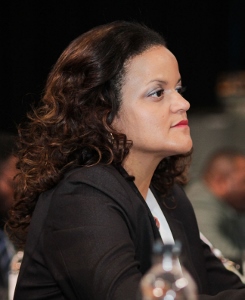
Rivers claims discrimination
 (CNS): The education and employment minister has taken aim at the local media after the coverage and backlash over her decision to go to the 59th Commonwealth Parliamentarians Conference (CPC) in Johannesburg. In a lengthy statement released from her ministry, Tara Rivers implied that the press was discriminating against her in what she described as “hasty and ill-informed” reports. She said that she was unable to respond to questions from the local paper due to time zone differences and had not received any from CNS, even though they were sent directly to the press secretary who responded on Friday. Rivers claimed that her travel plans were never hidden as they were published on social media.
(CNS): The education and employment minister has taken aim at the local media after the coverage and backlash over her decision to go to the 59th Commonwealth Parliamentarians Conference (CPC) in Johannesburg. In a lengthy statement released from her ministry, Tara Rivers implied that the press was discriminating against her in what she described as “hasty and ill-informed” reports. She said that she was unable to respond to questions from the local paper due to time zone differences and had not received any from CNS, even though they were sent directly to the press secretary who responded on Friday. Rivers claimed that her travel plans were never hidden as they were published on social media.
However, press releases from the premier’s office regarding both the Legislative Assembly meeting and the swearing in of temporary ministers while Rivers and the finance minister Marco Archer were away from the island told a different story. One release indicated that Juliana O’Connor-Connolly was travelling to South Africa for the CPA meeting and would not preside over last week’s parliamentary meeting but made no mention that Rivers would be joining the delegation which also included the opposition leader, McKeeva Bush. In a second release Rivers was described by the premier’s press secretary as being on leave and there was no mention made that she was on official business in South Africa when Winston Connolly was sworn in as a temporary minister while she was away.
While she was at the CPA Rivers missed, among other things, the start of the school year, the Caymanians teachers’ induction and the arrival of the new governor. However, Rivers justified her trip and accused the media of sensationalizing the issue.
"It is unfortunate that what is considered normal and expected participation of parliamentarians at such important conferences, especially women parliamentarians whose participation is actively encouraged by the Commonwealth Parliamentary Association (“CPA”), has been dealt with in this mannerby the local media,” she said in a statement stretching some four pages.
“The unfortunate coincidence and irony is that one of the main topics of discussion at the Commonwealth Women Parliamentarians conference was the discriminatory way in which women parliamentarians are often treated by the media in their respective countries. Discrimination against women in any and all forms is unacceptable and should not be perpetuated in the media or otherwise," as she implied that the reporting of her travel was discriminatory.
The new PPM government has introduced a travel policy to curb unnecessary travel by politicians and civil servants and cut the costs when it is necessary as a result of the public backlash regarding travel under the UDP government. However, Rivers appeared not to see why there was public outcry regarding her decision to go to Africa.
Rivers said her plans were in plain view of the people, as “posted information about my whereabouts and activities on my social media pages,” she stated. “But what the local media needs to appreciate is that we are in a new era of government and now is not the time to be sensationalising issues that have very simple explanations. Responsible journalism and understanding of the negative consequences of hasty and ill-informed reporting is paramount to stability and good governance. To carry on in any other manner is not good for our country or the media in which it is reported,” she added as she pointed the finger at the press.
"I do not expect to be above questioning or even criticism by the press that is part and parcel of being an elected official. I do, however, expect to be treated equitably and with respect by the press. It's disappointing that there was more importance given to rolling out a salacious story before the weekend, fueled from a one sided, ill-informed perspective, than to reporting from a balanced and informed perspective, “Rivers continued in her attack.
“From the obvious haste in which the articles were put together and the unreasonable time frame requested for a response to questions received at the 11th hour, coupled with the content of the article and editorial, it is clear that the intention was to impart controversy at the expense of the truth,” she said pointingto coverage in the Caymanian Compass.
“I have received an outpouring of support and anger from so many of my constituents over the recent coverage. It is important that the media understands the affect they have on our society when they choose to make eye catching headlines without real substance,” she said.
Describing the coverage as a storm in a teacup Rivers said she was “diligently attending the conference and representing the Cayman Islands’ experience through her many contributions to the discussions” throughout the week she was in Johannesburg.
She added that it was “a positive and enlightening experience” which she said the country “will greatly benefit “from because of her more informed capacity as minister. Thanking the Cayman Islands branch of the CPA for giving her the chance to go and the premier for supporting her she said she looked forward to building upon the experience.
In the lengthy release Rivers said she was now better equipped to tackle the many issues and subject areas for which she has responsibility.
"Participating in the CPC was an absolutely worthwhile and directly beneficial experience,” said Minister Rivers. “Much of the plenary sessions and discussions I attended and in which I participated centred around the concerns of education, employment and gender affairs. These are areas of concern throughout the commonwealth, and the ability to share ideas and experiences as parliamentarians and the networking opportunities which facilitates further exchange of information was extremely helpful," she said.
The minister said she was able to discuss the issue and come away with some examples of concrete solutions being implemented in jurisdictions that are similar to Cayman all of which was valuable information which she said would help guide her in developing similar programmes for the local unemployed
Rivers said she has a strong history of attending overseas conferences and implementing solutions locally. "As a civil servant in the late 1990's, I attended a workshop facilitated by the Commonwealth Youth Programme, held in Dominica, which dealt with developing National Youth Policies,” she said. “As a result of attending that conference, and the information learned there, I was able to successfully spearhead the development of the first comprehensive National Youth Policy for the Cayman Islands.”
Rivers stated that as a minister she expected to operate no differently, as she signaled more potential travel on the public purse.
“My participation at overseas workshops and conferences aimed at parliamentarians and ministers will be used to help facilitate the development of policies and programmes locally. Our country is simply in no position to lose out by not being at the table," she added.
See the official release from the ministry in full below
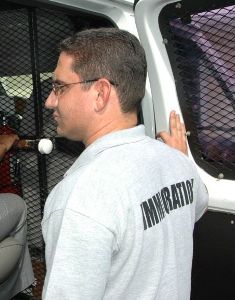
Cash found for immigration
 (CNS): Premier Alden McLaughlin has confirmed that money has been found in the forthcoming budget to fund the changes at the immigration department which, will see an increased headcount to both process permits more quickly and enforce the law. Over the last week or so the premier has been doing the media rounds talking about the need to replace the boards, ensure employers are compliant and to generally fix a system which has failed to safeguard Caymanians in the workplace. With almost 20,500 foreign workers in Cayman but an estimated 2000 plus Caymanians out of and looking for work, it is increasingly apparent that things have gone awry when it comes to prioritising local labour.
(CNS): Premier Alden McLaughlin has confirmed that money has been found in the forthcoming budget to fund the changes at the immigration department which, will see an increased headcount to both process permits more quickly and enforce the law. Over the last week or so the premier has been doing the media rounds talking about the need to replace the boards, ensure employers are compliant and to generally fix a system which has failed to safeguard Caymanians in the workplace. With almost 20,500 foreign workers in Cayman but an estimated 2000 plus Caymanians out of and looking for work, it is increasingly apparent that things have gone awry when it comes to prioritising local labour.
Despite facing controversies over his decision to lift the seven year rollover, which will allow some 1500 holders of temporary exemption permits to stay in Cayman and apply for permanent residency, McLaughlin has promised more scrutiny of work permits and employer compliance.
“The real challenge for immigration has been that it has not had the resources to check that employers are compliant,” he said last week, adding that it was now abundantly clear that permits were being granted when they shouldn’t be. “I believe we can significantly improve the process to assist both employers and local people.”
He explained that with so many people on work permits, it has not been possible for the immigration department with its current staffing levels to check them all and to ensure the conditions under which the permits were granted reflect the reality of the employment situation.
“The system has not worked for years,” the premier said, adding that for as long as he could remember local people have complained about jobs going to foreigners and not Caymanians.
While promising more due diligence, the premier has also warned that government cannot send the wrong signals with the process of reform as the business community has to be confident that it can still recruit the talent it needs to keep the economy going.
“We need to be careful as we are dependent on foreign labour and we can’t be anti-foreign but we are keen to send a message that the review of the immigration system will be fair to Caymanians. We will do best to ensure where a Caymanian is willing and able they will get work,” McLaughlin stated.
With government’s planned reform in two stages, it is beginning with the removal of rollover and dealing with the Term limit extension permit holders (TLEPs) in conjunction with the revamping and tightening of the point system for granting permanent residency. While all of the TELPS will now be able to apply for PR, McLaughlin made it clear that they will not all get it and will still need to leave the island if they are refused. Government is expected to have made these necessary policy and legislative changes by October.
The second phase will be in April when the broader issues of the immigration system will be addressed and when the government will also look at whether its foreign workers should be part of the wider immigration regime as the most recent work conducted by the last immigration review team headed up by Sherri Bodden-Cowan recommendedthat they should be treated in the same way as work permit holders.
With the community concerns about the removal of rollover undermining Caymanian opportunities in the work force, speaking on rooster’s Crosstalk recently Bodden- Cowan emphasised once again that the policy was never intended as a mechanism to get Caymanians employed but to prevent every person who comes to islands getting Cayman status. Both Bodden-Cowan and McLaughlin have been at pains to point out that the rollover issue is separate and apart from the issue of employing local people.
See the latest immigration figures here:

Employers claim diligence in recruitment of thief
(CNS): A local law firm that became the victim of "sophisticated and calculating "white collar thief to the tune of US$846,000 said that they were diligent when they recruited Michael Levitt as chief financial officer as he had a clean police record and references from his employment history in Cayman including with a financial firm. Solomon Harris took on the fraudster in 2008 by which time he had been in the Cayman Islands for around four years having first arrived in 2004 in the wake of Hurricane Ivan on an emergency permit to work at the Westin Hotel. Having concealed his fraudulent past Levitt was able to take up various positions before securing the job with the law firm.
In the wake of Levitt’s sentencing hearing on Friday when he was sent down for seven anda half years the firm welcomed the result and defended its recruitment process in a statement released Monday.
“Solomon Harris carried out extensive due diligence on Mr Levitt before offering him employment, including taking up references locally and overseas, obtaining his practising certificates and ensuring he was in good standing professionally,” a spokesperson for the firm said.
“Regrettably, Mr Levitt was employed in Cayman for a number of years , including with a financial institution, before taking employment with the firm and was able to obtain a clean police record locally. Mr Levitt’s professional qualifications with two South African accountancy bodies were both current during the time that he was employed with us notwithstanding his conviction for fraud in South Africa,” the firm added.
The court heard Friday that Levitt was convicted in his native South Africa for fraud related offences and given a seven year sentence but during that time the crown said he was also wanted in Canada. Michael Snape prosecuting counsel told the court that he was tried there in his absence and sentenced to three years which the Canadian courts accepted could be served in South Africa concurrently with his sentence there. However, this was a claim disputed by Levitt’s attorney during the sentencing when he said he was fined.
Nevertheless, Levitt had two theft and fraud related convictions under his belt before arriving in the Cayman Islands but managed to conceal that from all of his employers until it was too later and he began stealing from Solomon Harris.
As victims of the theft the law firm said that justice was served and it had always taken the view that it was imperative to bring Levitt to justice and not to accept his offer to negotiate with Solomon Harris in return for not pressing charges.
“We applaud Mr Justice Swift’s carefully thought out and well-reasoned judgment. His Lordship’s decision sends out a very clear message to other would-be white collar criminals in these Islands. The firm continues to vigorously pursue full restitution from Mr Levitt's wrongdoings,” the lawyers stated as if offered its gratitude to the FCU and DPP for their work on the case.
So far only around $200,000 has been recovered from Levitt but the court will hold a hearing in December in order to assess whether Levitt has further assets that could be seized by the crown.
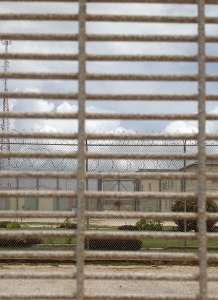
CI high on world lock-up list
 (CNS): The Cayman Islands has one of the highest rates of prisoners per capita in the world, according to research from an international charity specialising in prison issues. According to the ranking by the International Centre for Prison Studies, Cayman comes in at number 20 on the worldlist out of 223 countries. This means authorities here are locking up more people per person in the population than some of the most violent places in the world. While the United States tops the chart in first position with a rating of 716, Cayman, with a rate of 382, is among 14 Caribbean and Central American countries that dominate the top 20. In the Caribbean listing Cayman comes in at number ten from the 23 ranked countries, above both Jamaica and Trinidad.
(CNS): The Cayman Islands has one of the highest rates of prisoners per capita in the world, according to research from an international charity specialising in prison issues. According to the ranking by the International Centre for Prison Studies, Cayman comes in at number 20 on the worldlist out of 223 countries. This means authorities here are locking up more people per person in the population than some of the most violent places in the world. While the United States tops the chart in first position with a rating of 716, Cayman, with a rate of 382, is among 14 Caribbean and Central American countries that dominate the top 20. In the Caribbean listing Cayman comes in at number ten from the 23 ranked countries, above both Jamaica and Trinidad.
The Caribbean list is topped by St Kitts and Nevis with a rate of 714.
With an average of 212 inmates in the local prison system at a given time and a population of 55,500, the Cayman Islands was given a rate of 382 per 100,000. The rating and rank places Cayman above countries such as Honduras, Columbia, Nicaragua and Mexico, despite their greater crime levels. The UK, which has a rate of only 147, comes in at 104.
Despite having a very high rate generally for the overall population, when it came to locking people up on remand and before trial the Cayman Islands falls down the list to 149th, just one place above the UK. Although HMP Fairbanks has a very low number of female prisoners, on average females account for 5.2% of the local prison population placing, Cayman 81st in the world for locking up women. Given Cayman’s multi-cultural demographics, HMP Northward ranked 48th highest in the world for locking up foreign prisoners. But regardless of the well-documented overcrowding at HMP Northward, Cayman’s jail is still only the 93rd most packed jail house.
The World Prison Brief, launched in 2000, uses data specially compiled for ICPS to provide factual information about prison systems throughout the world, the charity states on its website.
Based in London, the ICPS, said the brief enables more evidence-based discussion of ways to improve prison systems in accordance with international human rights standards. Information is provided on prison populations and prison population rates per 100,000 of the national population, on the use of imprisonment for women and juveniles, on the extent of pre-trial imprisonment and on prison overcrowding, as well as a record of the national ministries responsible for prisons and contact details for prison administrations.
Information is updated on a monthly basis using data from reputable sources. The International Centre for Prison Studies said that it assists governments and other relevant agencies to develop appropriate policies on prisons and the use of imprisonment.
The organization notes however that a high rate is not always an indication that a particular government is locking up more people but that courts could be handing down longer sentences. With the courts in Cayman forced to hand down mandatory life sentences and the introduction of the ten year mandatory minimum sentence for unlicensed firearm possession, the average jail term has likely been lengthened significantly.